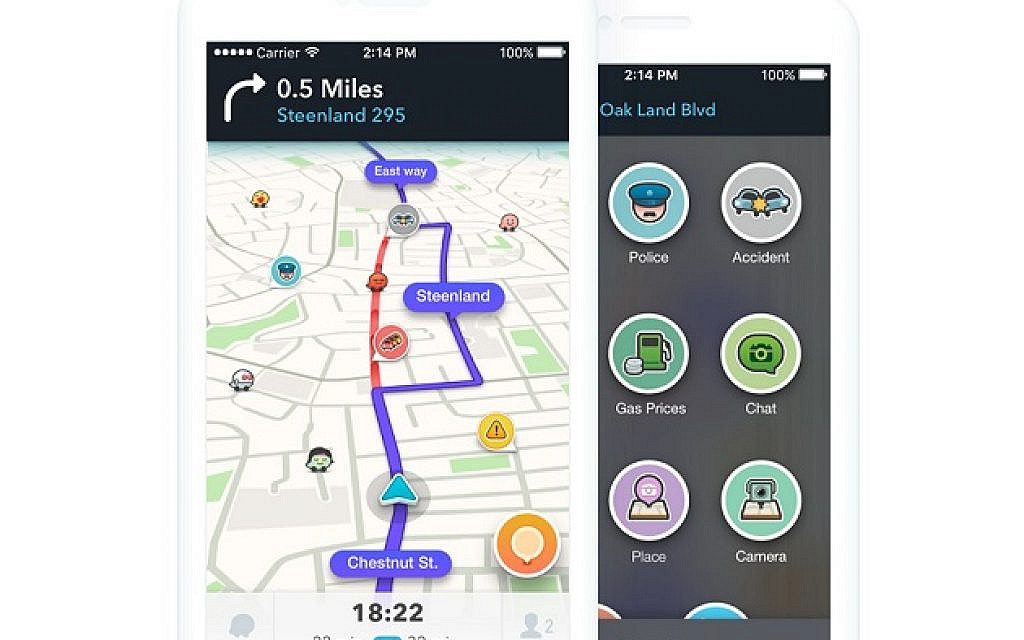Meet a VP at the Israeli go-to app Waze: ‘Carpooling will be a game changer’
In the latest instalment of Down to business, Candice Krieger talks to Fej (Yuval) Shmuelevitz, Waze's first employee, about the future of the app in big cities around the world
Traffic sucks. So says the website of the go-to-navigation app, Waze. And the Google-owned Israeli company, best known for helping users to avoid troublesome jams, appears more determined than ever to drive a change in the way we use cars as urban mobility reaches tipping point.
According to a report by McKinsey & Company, 60 percent of the world’s population will live in cities by 2030, up from around 50 percent today. And as it becomes an increasing reality that the existing urban infrastructure will simply not be able to support the increasing number of vehicles on the road, new technologies are emerging to solve the pending congestion crisis.
Waze was born in 2006 as a solution to help deal with congestion issues in Tel Aviv. It helps refine traffic routes using real-time information from its 130 million monthly users worldwide.
Get The Jewish News Daily Edition by email and never miss our top stories Free Sign Up
Earlier this month, Waze made a load of user data and driving patterns available to UK cities and beyond for free on Google Cloud as part of its Waze for Cities Data program. Its 12 UK partners covering London, Essex, Oxfordshire, Leeds, Middlesbrough and the West Midlands can now see and analyse driving trends within their cities to help manage traffic and plan for the future.
Fej (Yuval) Shmuelevitz, vice president of community and operations, says: “Integrating technology into urban mobility and city planning is critical if we want to help ease congestion across major cities.”
Israel-based Shmuelevitz, 54, was the first employee to be recruited by the Waze founders, having previously worked with them. He cites Waze for Cities as a prime example of the “Waze Way” and the company’s commitment to working with communities and governments to help improve urban mobility.
He says: “With Google Cloud, Waze for Cities partners will have access to the best-in-class tools making the data even easier to interpret and communicate for non-technical audiences.
“By offering tools for free, and having more advanced tools available, we hope this will help cities in fighting congestion and air quality issues.”
Previously known as the Connected Citizens Program, Waze for Cities launched in Rio de Janeiro in 2014 and now has more than 1,000 global partners. UK partners include Transport for London – around half of Waze’s UK users are reportedly based in the capital.
Shmuelevitz says: “We have to join the fight against traffic. It’s very concerning that we may reach a point of no return with emission levels. Now is the time to take responsibility and reverse these trends.”
Integrating technology into urban mobility and city planning is critical if we want to help ease congestion across major cities
Shmuelevitz joined Waze alongside the three founders: Ehud Shabtai, Amir Shinar and Uri Levine. He had worked with all three at technology company Comverse, where he spent 17 years. “We got chatting at a social event and Uri told me about Waze and I thought, ‘I have to join this.’”
Waze was initially Shabtai’s idea, which began as a project from his balcony after he’d been bought a GPS device.
The next year was spent developing the concept, which launched commercially in 2008, the year Shmuelevitz joined.
At the time, he was one of around 20 employees and there were 2,500 registered users. By the end of 2008, there were 17,000 users. “Today, if you came to VCs [venture capitalists] after two years with a mobile app and said you had 17,000 users you would be laughed at, but times were different – iPhones were just coming out. It was a changing mobile world and we were a part of it.”
We have to join the fight against traffic. It’s very concerning that we may reach a point of no return with emission levels. Now is the time to take responsibility and reverse these trends.
Today, there are 475 employees, 130 million monthly active users – including around 2.1 million in the UK – and it has become a way of life for many drivers. In 2013, it was bought by Google for a reported $1.3 billion (£835m). But it hasn’t always been a straightforward journey. “In the start-up days it was a challenge creating the awareness and getting users to believe in user-generated maps,” recalls Shmuelevitz, who has a degree in both maths and computer science, and law, from Tel-Aviv University.
“Google and Apple (maps) had their advantages and we had to differentiate. Google had good maps wherever they launched. When we started, we didn’t have any maps. They were being built by the users so we weren’t able to provide adequate directions to places they didn’t know. We encouraged people to use it for journeys they were familiar with, to improve their arrival time. We built the maps slowly, which made the navigation part less critical and that’s how we positioned ourselves. And slowly it spread to include lesser-known places.”
A turning point came in 2012 when Apple CEO Tim Cook posted a public apology following the launch of its own Apple Maps, which had some serious flaws. Cook suggested people use Waze until Apple had worked to correct things. “This was a game changer for us,” reveals Shmuelevitz. ”The following year, Google bought Waze. “This was definitely a kind of a stamp of approval that we were making it work.”
But Waze can’t afford to take its foot off the gas. The rate at which automotive apps are cropping up is accelerating, and technology-driven trends such as electrification, autonomous cars, and rideshare apps are set to revolutionise the industry.
Waze has developed its own dedicated spin-off app, Waze Carpool, connecting commuters and drivers going in the same direction. “Carpooling is a big differentiating feature for Waze,” says Shmuelevitz. “This will be another game changer.”
While carpooling isn’t a new concept, increasing congestion and environmental concerns, coupled with technological advances is causing the industry to grow at an indomitable pace. The global market is due to reach US $8,540m (£6,762m) by 2024, up from $4,250m (£3,365m) in 2019.
Waze Carpool is experiencing around a monthly 15 percent growth rate and tens of thousands of people have signed up. “We believe carpooling will only become more popular as more ride-sharing initiatives develop,” says Shmuelevitz, pointing out that private car ownership is becoming less favourable in today’s society. “Young people are preferring to rent rather than buy, and there’s been a marked increase in sharing economy companies such as Airbnb.”
Waze Carpool piloted in Israel in 2015 and has been rolled out to other countries, including Mexico, Brazil, and the US. The company is unable to comment on future carpool plans, but it surely can’t be long before it reaches the UK, reportedly the world’s 10th most congested country. After all, traffic sucks.
Fej (Yuval) Shmuelevitz
With Candice Krieger – candicekrieger@googlemail.com

Thank you for helping to make Jewish News the leading source of news and opinion for the UK Jewish community. Today we're asking for your invaluable help to continue putting our community first in everything we do.
For as little as £5 a month you can help sustain the vital work we do in celebrating and standing up for Jewish life in Britain.
Jewish News holds our community together and keeps us connected. Like a synagogue, it’s where people turn to feel part of something bigger. It also proudly shows the rest of Britain the vibrancy and rich culture of modern Jewish life.
You can make a quick and easy one-off or monthly contribution of £5, £10, £20 or any other sum you’re comfortable with.
100% of your donation will help us continue celebrating our community, in all its dynamic diversity...
Engaging
Being a community platform means so much more than producing a newspaper and website. One of our proudest roles is media partnering with our invaluable charities to amplify the outstanding work they do to help us all.
Celebrating
There’s no shortage of oys in the world but Jewish News takes every opportunity to celebrate the joys too, through projects like Night of Heroes, 40 Under 40 and other compelling countdowns that make the community kvell with pride.
Pioneering
In the first collaboration between media outlets from different faiths, Jewish News worked with British Muslim TV and Church Times to produce a list of young activists leading the way on interfaith understanding.
Campaigning
Royal Mail issued a stamp honouring Holocaust hero Sir Nicholas Winton after a Jewish News campaign attracted more than 100,000 backers. Jewish Newsalso produces special editions of the paper highlighting pressing issues including mental health and Holocaust remembrance.
Easy access
In an age when news is readily accessible, Jewish News provides high-quality content free online and offline, removing any financial barriers to connecting people.
Voice of our community to wider society
The Jewish News team regularly appears on TV, radio and on the pages of the national press to comment on stories about the Jewish community. Easy access to the paper on the streets of London also means Jewish News provides an invaluable window into the community for the country at large.
We hope you agree all this is worth preserving.
-
By Laurent Vaughan - Senior Associate (Bishop & Sewell Solicitors)
-
By Laurent Vaughan - Senior Associate (Bishop & Sewell Solicitors)
-
By Laurent Vaughan - Senior Associate (Bishop & Sewell Solicitors)
-
By Laurent Vaughan - Senior Associate (Bishop & Sewell Solicitors)























